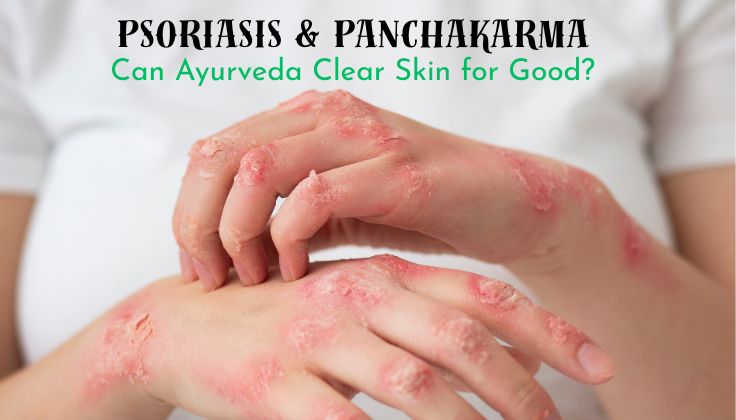


Psoriasis is a long-term skin issue that causes red, scaly, and often itchy patches. These patches can appear anywhere, but they show up on the parts of the elbows, knees, scalp, and lower back. Do you know that around 125 million people worldwide are living with this skin problem? This chronic skin condition affects about 2-3% of the global population. In the United States, around 7.5 million adults are estimated to have psoriasis.
Many people feel embarrassed and frustrated because these patches can keep coming back even after treatment. Modern treatments like creams, light therapy, and medicines can reduce the symptoms, but they do not always stop the disease completely. As a result, many people begin searching for natural methods to improve their skin health. Ayurveda is one of the popular traditional approaches that offer an alternative way to manage psoriasis. Psoriasis and Panchakarma: Can Ayurveda Clear Skin for Good? Is a detailed guide on how Ayurveda works for the skin condition by the professionals at Ayurheriatage, the top Ayurvedic hospital in Dubai.
Psoriasis is an autoimmune condition causing the cells to grow too fast, leading to thick and scaly patches. It is not contagious, so it cannot spread from person to person. The exact cause of psoriasis is not fully understood, but it is linked to genetics, immune system issues, stress, certain medications, skin injuries, and infections.
People with psoriasis often go through cycles. Sometimes the patches improve or even disappear, while at other times they flare up and worsen.
The symptoms of this condition can vary from person to person. It also depends on the type of psoriasis. The most common signs include:
Red patches of skin covered with silvery-white scales
Dry and cracked skin that may bleed at times
Itching/ burning, or soreness in affected areas
Thickened or ridged nails
Painful or swollen joints
Psoriasis can also cause emotional stress and lower self-confidence, especially if it appears in visible areas like the face or hands.
Ayurveda calls the skin condition "Kitibha," a type of skin disorder caused mainly by imbalances in Vata and Kapha doshas. Ayurveda believes that improper diet and lifestyle create toxins in the body (called ama), which mix with blood and spread to the skin. Ayurveda focuses on correcting these imbalances and cleaning the body from the inside to restore healthy skin.
Panchakarma is a deep cleansing and detox method used in Ayurveda. It mainly includes the main therapies
Vamana (vomiting)
Virechana (purgation)
Basti (medicated enema)
Nasya (nasal treatment)
Raktamokshana (bloodletting).
These treatments aim to remove toxins, improve digestion, and bring back balance to the doshas. Panchakarma is often suggested for chronic skin problems like psoriasis, as it works on the root cause rather than only the symptoms.
Poor gut health and toxin buildup are often cited as the reason behind the skin condition. Panchakarma therapies help to clear these toxins, improve metabolism, and support better skin health.
Vamana (Therapeutic vomiting): Clears extra Kapha dosha and reduces heaviness.
Virechana (Purgation): Targets Pitta dosha, supports liver health, and helps remove toxins through the intestines.
Basti (Medicated enema): Corrects Vata dosha and improves gut health, which has a strong connection to the skin.
Raktamokshana (Bloodletting): Helps clean the blood and reduce skin inflammation.
Other supportive therapies like herbal oil massages and steam baths also help improve circulation and skin nourishment.
Herbs including turmeric, neem,guducui, and manjistha are known for their blood-purifying and anti-inflammatory properties. They are vital herbs that are a part of the treatment.
During the treatment, the patient needs to follow a strict diet. A strict diet is advised to support detox. People are encouraged to avoid spicy, oily, sour, and salty foods. Green leafy vegetables, fruits, whole grains, and warm water are recommended to help digestion and reduce toxin formation.
Many people see improvement after Ayurvedic treatment. Skin becomes clearer, itching reduces, and flare-ups become less frequent. However, its important to keep in mind that psoriasis is a long-term condition. It also get aggravated due to triggers like stress, weather, and certain foods.
Ayurveda does not guarantee a complete and permanent cure for every person, but it aims to manage the condition better and improve overall health. Following diet advice, taking prescribed herbs, and maintaining a healthy lifestyle can reduce the condition’s occurrence.
Unlike modern medicine, Ayurveda mainly addresses the root cause rather than just surface symptoms.
Improves digestion and body immunity
Uses natural herbs and therapies, which are generally safe when supervised
Promotes mental relaxation and reduces stress, which is important for skin health
Things to consider before starting Panchakarma
Panchakarma should only be done under the care of a qualified Ayurvedic doctor. It is a strong treatment that needs professional guidance.
People with other health conditions like diabetes or heart problems should discuss these in detail before starting. Proper rest and a peaceful environment also help achieve better results during Panchakarma. If you are looking for authentic Ayurvedic treatment in Dubai, connect with our experts at Ayurheritage.
Keep skin well moisturised
Avoid harsh soaps and strong chemicals
Follow a healthy, balanced diet
Manage stress through yoga, breathing exercises, and enough sleep
Wear soft, breathable clothes and avoid scratching
Some studies have shown that Ayurvedic treatments and Panchakarma help reduce psoriasis symptoms and improve quality of life
To conclude, Psoriasis affects not just the skin but also a person’s confidence and mental well-being. Many people look for natural ways to handle it because modern medicines might only give temporary relief.
Ayurveda offers a gentle and natural approach to manage psoriasis by working on the root cause and supporting overall health. Panchakarma, along with herbs and diet changes, can help improve skin and reduce repeated flare-ups.
Even though Ayurveda might not offer a total cure, it can bring long-lasting relief and a better quality of life. Anyone considering this path should speak to an experienced Ayurvedic doctor and follow the treatment plan closely.
A steady mind, healthy food habits, and regular care can make a big difference for those living with psoriasis.